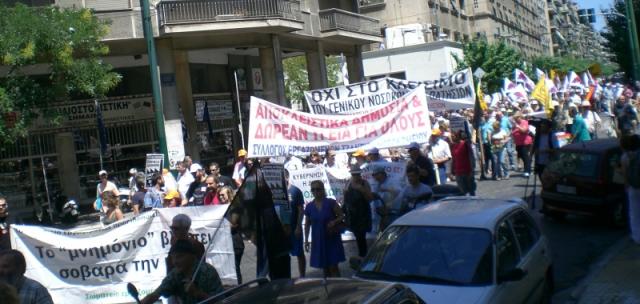Victoria Mindova
It is "the end of public health". This is how doctors and medical staff define the government's plan to close 50 of the 132 hospitals in Greece. The employees in the National Health Organization for Health Care Provision have announced on Wednesday a 24-hour strike to show their disagreement with the policy pursued.
"Over the past few years we have been operating with a reduced staff due to the redundancies and the imposed policy of fiscal consolidation. Now they will close more than one third of the hospitals in the country. We cannot allow this to happen," Yiannis Sigounakis told GRReporter. He is chairman of the union of employees in the central hospital of Chania, which is one of the largest cities on the island of Crete.
He explains that hospitals in Greece are experiencing serious shortages of materials and medicines. Women about to give birth are bringing sheets, nappies and other materials needed for the birth because hospitals are unable to cover their costs. For the same reason, the patients of many hospitals bring their own supply of syringes, bandages and analgesics, although they should be available in the hospital.
"The hospital in Chania, which serves not only a large part of Crete but also the surrounding islands, is working with 230 people less than the number of employees stipulated in the programme for the operation of the hospital. We serve the islands nearby and, during the summer, we must meet the needs of tourists as well. The region's population increases more than 10 times during the tourist season. We are unable to cope with the workload and now the government wants to shut down nearly half of the hospitals in the country," said Sigounakis expressing his indignation.
The government's plan to reform the healthcare system does not yet provide for dismissals of medical workers. Competent Minister Adonis Georgiadis states that the free medical staff after the closure of hospitals will be included in the mobility programme. This suggests that the unemployed doctors in the public healthcare system will be allocated to regions where a shortage of medical care staff has been established.
"This may sound good, but it is madness. The new appointments will be with new salaries to the amount of about 600 euro. You cannot expect that a doctor whom they will send from Thessaloniki will come to work on the island of Crete for this salary and will be able to afford to rent a house and make a living. Relocating to a new city or island requires costs which no one can afford at present. This is another step towards the destruction of public health," states Sigounakis.

The latest report of the supervisory Troika of the International Monetary Fund, the European Central Bank and the European Union shows that the costs in the healthcare system are one of the major problems in the budget. Many hospitals and health funds have nearly spent, yet in the first half of the year, the funds allocated by the end of the year. An inspection carried out in early July shows that the National Health Organization for Health Care Provision (ΕΟΠΥΥ), which has taken over the majority of smaller health funds, has a deficit of 4.5 billion euro. Despite the significant cuts in paid medicines and the reduction of the prices of others, the costs in the sector remain high.
Attikon Hospital in Athens is one of the largest health centres in the region. It will not be closed, but its doctors and support staff are exhausted.
"We have closed, in stages, four wards for two weeks during the summer because their staff did not take a day off or a vacation last year. There are not enough people and very often the employees do double shifts," said Yiannis Plagianakos, chairman of the working union of Attikon’s employees.
Currently only 14 of the 27 beds in the intensive care unit can be used. The children’s ward is not operating either. In the maternity ward, only 4 of the 22 places for infants are operating whereas the radiology and urology departments are closed due to cuts in the budget.
The hospital management does not allow the staff to take paid vacations or compensations for overtime work during the year because the shortage of staff is dramatic. "The closure of 50 hospitals in the country will completely destroy the healthcare system. We do not have enough beds for the reception of patients. What will happen next year? Will people die in the street?" Plagianakos asked ironically.
On the day of the strike, the doctors held a protest procession from the Ministry of Health to the Ministry of Administrative Reform which are the two main government departments responsible for the restructuring of the sector. The protesters demanded a meeting with the Minister of Administrative Reform, Kyriakos Mitsotakis, who did not receive them personally. Although the public opinion is against the new cuts in the healthcare sector it is expected that the reform will continue and hospitals will be closed.